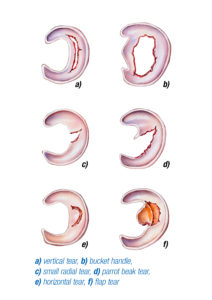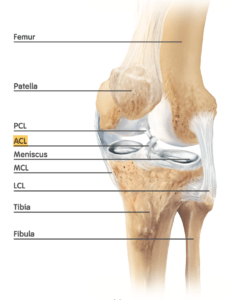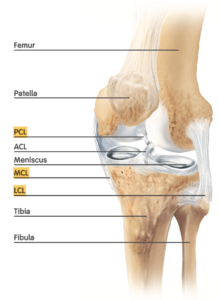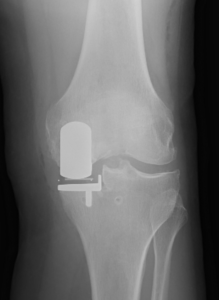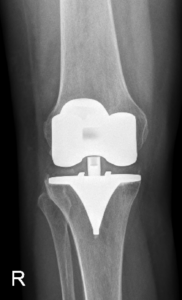Knee
Comprehensive information about conditions and treatments available for the knee.
Knee Conditions & Treatments
Meniscal Tears and Knee Arthroscopy
There are 2 C-shaped cartilages inside the knee called the menisci. These act like a shock absorber in the knee, and prevent arthritis from developing.
Meniscus tears are amongst the most common knee injuries. These usually occur with a twisting injury to the knee, but can sometimes happen in a knee which is naturally aging.
Meniscus tears can present with:
- Pain at the level of the joint
- Swelling
- Locking
- Clicking
- The knee giving way
There are many different types of meniscus tears as seen below.
Depending on which type of tear you have, treatment is varied from rest, ice and elevation to keyhole (arthroscopic) surgery to trim or repair the meniscus. It is important to preserve as much functioning meniscus as possible in order to minimise progression of arthritis, so if a tear is reparable, especially in a young person, meniscal repair is advised. Similarly, if the tear is not reparable, resecting as little meniscus as possible in order to create a stable base is the best outcome.
Dr Yeoh is highly skilled at knee arthroscopy and all types of meniscal surgery, and will discuss an individualised plan for you.
Click HERE to read more information about meniscus tears.
Anterior Cruciate Ligament (ACL) Tears and Arthroscopic ACL reconstruction
The ACL is one of the most important stabilisers of the knee. It prevents abnormal rotation of the bones, as well as front-to-back motion. It is most commonly injured when a person suffers a pivoting injury with the foot planted, for example, pushing off or changing direction whilst playing sport.
ACL ruptures tend to present with:
- A ‘pop’ when it occurs
- Knee swelling
- Pain
- A sensation of instability or the knee giving way
Whether you need to have an ACL reconstruction depends on many factors including age, functional demand and severity of symptoms. Dr Yeoh will discuss this with you, and if surgery is recommended, he will also discuss this with you in detail.
Not all ACL reconstructions are the same, and Dr Yeoh is able to take different grafts or augment reconstructions depending on your particular problem. This individualised approach is essential, regardless of whether you are an elite sportsperson or a weekend warrior.
Click HERE to read more about ACL ruptures.
Multiligament Knee Injuries
Apart from the ACL, there are other important ligaments that stabilise the knee. These include:
- Medial collateral ligament (MCL)
- Lateral collateral ligament (LCL)
- Posterolateral corner ligament complex (PLC)
- Posterior cruciate ligament (PCL)
Whilst many of these can be treated successfully in a brace with intensive physiotherapy, others may come to need surgery.
Treatment will always be individualised for you, and Dr Yeoh will discuss this with you at length.
Patella (Knee Cap) Dislocation/Instability
The patella (knee cap) needs to glide in its groove to enable the knee to bend smoothly and painlessly. Sometimes, either due to trauma, or the way your bones have developed, the patella can either dislocate, or be unstable and not track very well.
This can present with:
- Knee instability
- Anterior knee pain
- Weakness
There are many reasons why this can occur and Dr Yeoh will need to organise multiple investigations to understand why this is happening.
Physiotherapy to strengthen the quadriceps muscle can often keep your symptoms at bay, but sometimes, a ligament reconstruction (MPFL reconstruction) or a bony procedure (tibial tubercle osteotomy) or a combination of these is required to regain patella stability.
If you have had an acute patella dislocation, it would be ideal to see a specialist and get an MRI to look for a fracture of the cartilage surface, as this may need to be fixed or removed with an arthroscopic procedure.
Click HERE to learn more about this condition.
Knee Arthiritis
Knee arthritis is very common and can be caused by many reasons. In most cases, arthritis is a degenerative process that occurs gradually over time, but it can also result from other conditions like injuries, and inflammatory conditions like rheumatoid or psoriatic arthritis. The cartilage of the knee wears out, and bone ends up grinding on bone, which is extremely painful.
Arthritis can present with:
- Pain
- Swelling
- Clicking
- Difficulty negotiating stairs, kneeling or squatting
Once non-operative treatments have been exhausted, and your knee is significantly impacting your life, then surgery may be an option. Depending on your pattern of disease, age and functional requirements, Dr Yeoh may discuss realignment procedures (osteotomy) or partial or total knee replacement.
(Partial knee replacement)
(Total knee replacement)
Whichever technique is discussed with you, Dr Yeoh and his team will ensure that you are well informed of the risks and benefits, so that you are comfortable with your decision.
Technology is a big part of Dr Yeoh’s practice, and he is a firm believer of using technology such as patient specific moulds, computer navigation or robotics to achieve the best implant alignment for each individual. Dr Yeoh is certified to use multiple robotic platforms each with their own advantages, and robotic knee replacement will be discussed with you.
More information about knee arthritis can be seen HERE and HERE.
What Operations are Possible for Knee Arthritis?
- Realignment Surgery (Osteotomy)
An osteotomy is performed to offload one particular compartment within the knee that has developed arthritis. This is usually performed in a patient who is too young for a knee replacement. Dr Yeoh uses computer navigation technology to ensure the leg is aligned to match your particular problem at the end of the operation.
Click HERE to learn more about this procedure.
- Unicompartmental (partial) Knee Replacement
In unicompartmental knee replacement (also called “partial” knee replacement) only a portion of the knee is resurfaced. This procedure is an alternative to total knee replacement for patients whose disease is limited to just one area of the knee.Click HERE to learn more about this procedure.
Dr Yeoh uses either robot assisted technology, or patient specific instrumentation to ensure the more accurate placement for the implant.
- Total Knee Replacement including Robotic Surgery
This is an operation where the knee cap (patella), thigh bone (femur) and shin bone (tibia) are all resurfaced with metal and plastic.This is a very successful operation to restore function and cure arthritis pain. Dr Yeoh will use either a robot, computer navigated techniques, or patient specific instrumentation to ensure that your implant is in the most accurate position possible, matched to your anatomy. We know that these forms of technology make a difference to how long your knee replacement lasts for, especially if you are under the age of 65.
Dr Yeoh will discuss these technologies with you, if you are a candidate for a knee replacement.
Click HERE to learn more about this procedure.
- Realignment Surgery (Osteotomy)
Revision Knee Replacement
If you already have a knee replacement that is failing you might be a candidate for a revision total knee replacement. This is a complex operation where some or all the parts of your previous knee replacement are removed and replaced with new parts. If you are a candidate for this, Dr Yeoh will discuss this with you at length. Custom implants may even be used to solve difficult problems.
(Source – https://orthoinfo.aaos.org/en/treatment/revision-total-knee-replacement)
Fractures around the Knee
Accidents can occur and there are many bones around the knee that can be broken. If you have broken your femur, tibia or patella, it is important to seek medical advice as soon as possible. Some fractures will heal without trouble in a brace, but others will need an operation to fix or replace it. Increasingly Dr Yeoh is seeing complex fractures surrounding pre-existing knee replacements, and some of these require megaprostheses.
Dr Yeoh regularly treats all knee fractures and is available for urgent appointments.
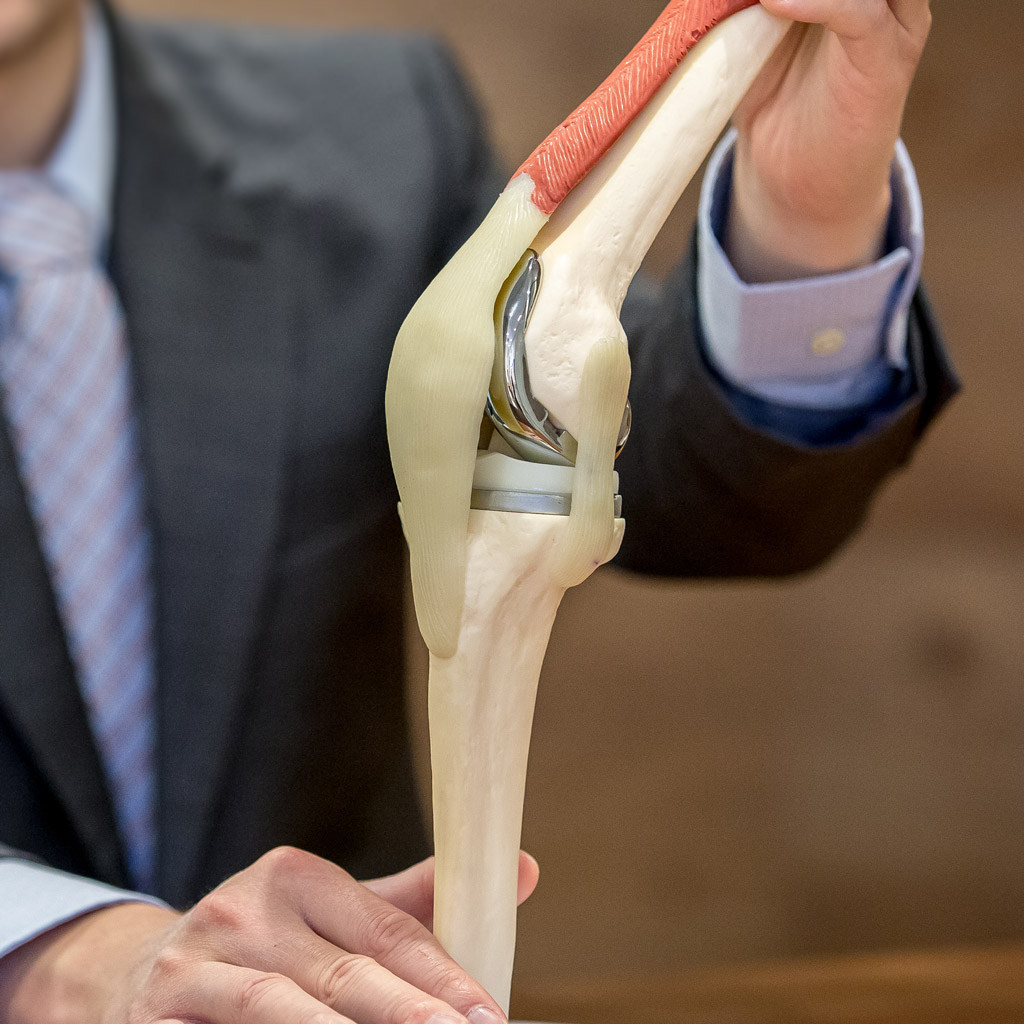
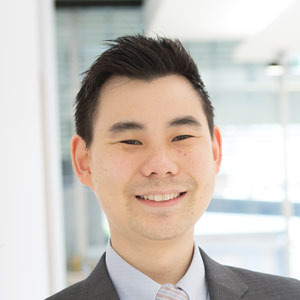
Knee Procedures - Multimedia
Contact us
Dr Yeoh and his team are here to support you and answer any questions you may have along the way.

